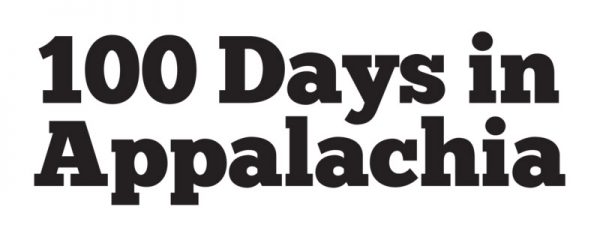A political polling project for high school seniors in Appalachia this month aims to respond to fears that young people are increasingly reluctant to have conversations about important social issues because of today’s divisive and aggressive political environment.
High school seniors in West Virginia and other states will be given the opportunity to nominate the political and social issues that are important to them, as well as their feelings about pivotal election issues such as immigration, America’s role in the world and health care, in an innovative polling project that will deliver questions to their cell phones via text message.
 100 Days in Appalachia, a reporting collaboration of Reed College of Media at West Virginia University, West Virginia Public Broadcasting and The Daily Yonder of the Center for Rural Strategies, will undertake the digital survey this month. It is being supported by Inspire U.S., a nonpartisan organization that encourages high school students to be civically engaged, and Teachers College at Columbia University, which will help distribute the survey to students in other states across the nation.
100 Days in Appalachia, a reporting collaboration of Reed College of Media at West Virginia University, West Virginia Public Broadcasting and The Daily Yonder of the Center for Rural Strategies, will undertake the digital survey this month. It is being supported by Inspire U.S., a nonpartisan organization that encourages high school students to be civically engaged, and Teachers College at Columbia University, which will help distribute the survey to students in other states across the nation.
Students will be asked eight to 10 questions over the course of two weeks in late September. Questions will be texted to students’ cell phones and will take just a few seconds to complete.
The nonpartisan survey will not ask students which political party they support. The goal of the project is to give young Americans the rare opportunity to describe how they feel about prominent political and social issues, away from the rigid framework of traditional partisan lines.
The polling will use the SMS-based platform GroundSource, which enables students to receive and respond to questions entirely via text message.
The project’s architect, Jake Lynch, community engagement editor at 100 Days in Appalachia, said that teenagers in Appalachia were too often excluded from public conversations about important social and political issues, and as a result, their hopes and concerns were rarely considered by political candidates, elected leaders or in the legislative process.
“I don’t think the media or our politicians have done a very good job of listening to what high school kids really think about certain issues, or of properly understanding who this next generation of voters is,” he said. “By creating this opportunity for them to speak freely about the big issues, and to stand where they want to stand on these issues, I think we’ll learn a lot about our democracy and where our country is headed.”
Lynch also said that young people were reporting that the belligerent, divided mood of the time was discouraging them from discussing important issues at school, at home or on social media.
“That any American teenagers — our next generation of voters — are avoiding engaging in conversation about the real and pressing issues that will shape their lives and define their nation is a worry,” he said. “This polling project aims to respond to this urgent problem by giving students a safe space to express their opinions, and to have those opinions directly inform news coverage of coming elections.”
“That any American teenagers — our next generation of voters — are avoiding engaging in conversation about the real and pressing issues that will shape their lives and define their nation is a worry.” — Jake Lynch
Zoe Hill was a senior at Independence High School in Sophia, W.Va., when she took part in 100 Days in Appalachia’s pilot polling project in April, that surveyed a small group of students in five high schools in West Virginia, North Carolina and Kentucky.
She said the bellicose rhetoric and combative tone taken by many public figures around flashpoint issues at the moment had trickled down into her school and her everyday life, tainting conversations amongst her friends and family members.
“I think it deters a lot of people away from political issues because, in some circumstances, it’s just not worth the hassle to discuss with others,” Hill said. “Both political parties are so opposite that they create a gray area between them. It is hard as an American teen to not get caught up in all the negativity.”
Hill identified as conservative but said she also held traditionally liberal viewpoints on some issues, such as LGBT rights, a mixture of stances that does not align with the usual partisan line on either side and which put her at odds with some friends and family.
Olivia McCuskey, a regional manager with Inspire U.S., which is partnering on the project in West Virginia, said she heard similar concerns from high school students she worked with.
“Students saw how divisive the 2016 presidential election was and how the political atmosphere still tends to be today,” she said. “For any student that is only slightly interested in politics, this doesn’t exactly instill a desire for young people to talk about issues with their friends, much less want to get involved.”
McCuskey said it was very significant that the 100 Days in Appalachia polling would not ask students to chose one party over the other, or for them to take partisan sides.
“By removing party politics from the equation and creating a safe space for students to express their opinions about key political and social issues without fear of any repercussions or arguments, it makes for a positive environment that fosters conversations like this more,” she said.
“By removing party politics from the equation and creating a safe space for students to express their opinions about key political and social issues without fear of any repercussions or arguments, it makes for a positive environment that fosters conversations like this more.” — Olivia McCuskey
Erika Kitzmiller, a historian of race, inequality and education, and a faculty member at Teachers College, Columbia University, said although there had been a concern about the civic engagement of young people in America for decades, the perspectives and ideas that young people have had been downplayed or neglected in the civic sphere.
“By asking the youth directly about their beliefs on issues that will affect all of us, this project seeks to ask them what they think about some of the most pressing issues that our nation faces today,” she said.
In the 2017-18 school year, Inspire West Virginia worked in schools across the state to help register 6,542 new high school voters. During that period, the West Virginia Secretary of State’s office said 22,518 high school seniors registered to vote.
Educators, students and parents interested in their school participating in the survey can visit www.100daysinappalachia.com/pollingproject/ for more information.
• 100 Days in Appalachia is an independent, nonprofit news outlet incubated at the Media Innovation Center of West Virginia University Reed College of Media in collaboration with West Virginia Public Broadcasting (WVPB) and The Daily Yonder of the Center for Rural Strategies in Kentucky. It has an open-source, co-publishing model and shares content from Appalachia’s diverse communities with regional, national and international media organizations.



